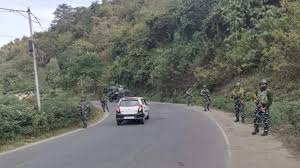
Manipur: Kuki-Zo Council Rejects Allegations Linking German-Tiger and Singheu Roads to Drug Trafficking

 :
| Updated On: 21-Jul-2025 @ 2:04 pm
:
| Updated On: 21-Jul-2025 @ 2:04 pmSHARE
The Kuki-Zo Council (KZC) has issued a strong rebuttal against recent allegations made by certain Meitei groups, who have reportedly labeled the German-Tiger and Singheu Roads as “drug routes.” In a detailed public statement, the KZC categorically rejected these claims, calling them entirely baseless and lacking any credible evidence. The council emphasized that such accusations are not only misleading but also appear to be deliberate attempts to defame the Kuki-Zo community and destabilize crucial humanitarian corridors that are vital for civilian movement and survival.
According to the KZC, the portrayal of these roads as drug trafficking routes is highly irresponsible and seems motivated by a larger political and social agenda aimed at marginalizing and isolating the Kuki-Zo population. The statement expressed deep concern that these narratives are strategically designed to undermine the community’s efforts at self-reliance and connectivity, especially in the aftermath of ethnic violence.
The backdrop to the controversy lies in the ethnic unrest that erupted on May 3, 2023, which rendered it unsafe for Kuki-Zo civilians to access Meitei-dominated regions. As a result, the community took the initiative to revive and upgrade old inter-village tracks to meet their transportation needs. The German-Tiger Road, connecting Churachandpur and Kangpokpi, was developed from one such traditional path. Similarly, when access to Sugnu became unfeasible, the Singheu route emerged as the only viable link to Churachandpur, Chandel, and Tengnoupal—despite lacking basic infrastructure like bridges.
Highlighting the significance of these roads, the KZC clarified that they serve as humanitarian lifelines, enabling the transport of food, medicine, schoolchildren, and civilians. These routes were born out of necessity due to the community’s isolation and are not being used for military or commercial operations. Their development was a grassroots effort reflecting the community’s determination to stay connected amidst ethnic tensions.
The Kuki-Zo Council also hinted that the resurfacing of such allegations might be a calculated move to distract the public from the ongoing “Biren Audio Tape” controversy, which has triggered considerable political unrest in the state. The council expressed concern that targeting the roads could be a tactic to divert attention from this significant issue.
In conclusion, the KZC called upon the central government to intervene constructively by aiding the development of these critical roads instead of vilifying them. They emphasized that these routes symbolize the community’s strength, resilience, and will to survive in the face of adversity, including violence, displacement, and long-term blockades. The council urged the government and broader society to recognize the roads for what they truly are—symbols of hope and survival, not conduits for criminal activity.
By defending the legitimacy of the German-Tiger and Singheu Roads, the Kuki-Zo Council underscored the broader implications of ensuring infrastructure access and civil dignity for marginalized communities in conflict zones.